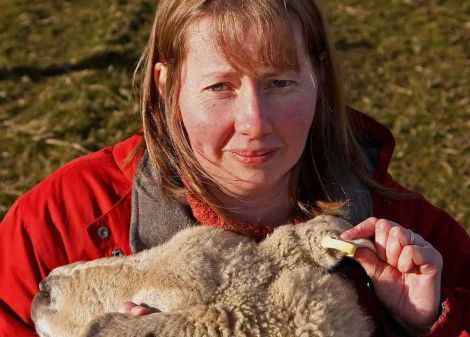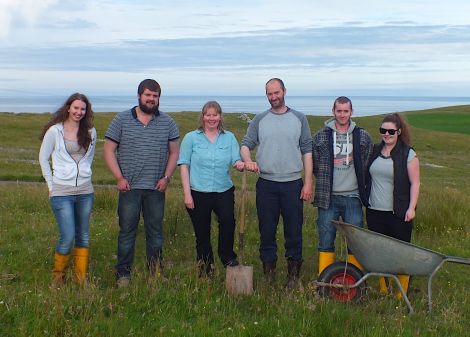News / Local crofter joins group lobbying for a new farming policy
SHETLAND crofter Hazel Mackenzie is one of the founding members of a new national lobbying organisation set up to influence farming policy post-Brexit.
The Nature Friendly Farming Network (NFFN) will be launched at the Real Farming Conference, in Oxford, on Friday (5 January).
The group of more than 100 farmers from across the UK hope to influence rural affairs secretary Michael Gove as he draws up agricultural policy beyond 2019.
The NFFN said it is essential for Britain to have a farming policy that reverses the decline in wildlife, restores depleted soil quality and helps to manage the impact of climate change while at the same time enabling the industry to produce healthy and affordable food.
In his keynote speech to the conference on Thursday, Gove has already confirmed that basic payments under the Common Agriculture Policy (CAP) would continue for five years after Brexit, but he gave no commitment for environmental payments or support to hill farmers.
Mackenzie, who runs a croft at Aithsetter in Cunningsburgh with her husband Kenneth, is a former president of the local branch of the NFU.
The 46 year old is calling for an effective policy change and for more farmers to join the network.
“Although we don’t really know yet what Brexit has in store for us, it is probably a ‘once in a lifetime’ opportunity to encourage the government to support nature friendly farming,” she said.
“It is so difficult to get policy changed once it is in place and we need to get it sorted out now.”
The couple play an active role on the committee of the Cunningsburgh show and are also well known locally for peatland restoration, a project they were recognised for in 2015 when they were the runner up in the Heather Trust’s Golden Plover award.
Become a member of Shetland News
The Mackenzies diversified by building two holiday lodges on the croft a few years ago, and they also opened a new café and farm shop last summer.
“Crofters and farmers are the key to nature protection. It does not take much effort to protect nature, if the farmer is willing to make the commitment,” she said.
“Nature needs a voice. The numbers of some birds and wildlife are diminishing year on year. While there are various reasons for this that cannot be halted, some can, and we need to act. We need policies written or influenced by real farmers and the people on the ground.”
NFFN chairman Martin Lines, from Cambridgeshire, said that Britain needed to change its approach to agriculture.
Existing farm practices often rely on the heavy use of chemical pesticides and herbicides, which have a profound impact on biodiversity and public health, the NFFN said.
Farm birds, a key indicator of the health of wildlife, have declined by 54 per cent since 1970. Over the last 50 years, there has been a marked decline in over 600 farmland species across the UK.
“Brexit presents a once in a generation opportunity to create a new farming policy that will help farms evolve and thrive, at the same time as restoring and protecting our natural heritage,” he said
“We can use this opportunity to create a long-term, stable policy framework that will drive a mainstream shift towards a sustainable, productive, nature-friendly future for British farming as well as protecting the landscape across the UK.”
The Nature Friendly Farming Network believes that post-Brexit agriculture policy should:
- Help all British farmers to produce safe, healthy food at the same time as helping our soil, landscapes, rivers and wildlife to recover and flourish.
- Maintain and redirect farming subsidies towards mainstreaming nature friendly farming across the UK.
- Recognise that the shift towards a more nature friendly approach is not just good for wildlife, but is key to the long-term survival and success of British farming, delivering broader benefits to the public.
Mackenzie added: “Nature friendly farming is a way of life and a commitment to valuing the land that we live in. By coming together as a group and a network we can be heard with one voice.
“We can encourage the government and other farmers to think about the contribution that they can make and ask to be fairly rewarded for the conservation work we do.”
Become a member of Shetland News
Shetland News is asking its readers to consider paying for membership to get additional perks:
- Removal of third-party ads;
- Bookmark posts to read later;
- Exclusive curated weekly newsletter;
- Hide membership messages;
- Comments open for discussion.
If you appreciate what we do and feel strongly about impartial local journalism, then please become a member of Shetland News by either making a single payment, or setting up a monthly, quarterly or yearly subscription.





























































